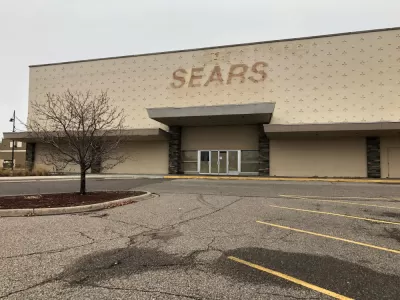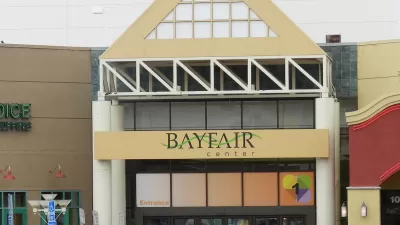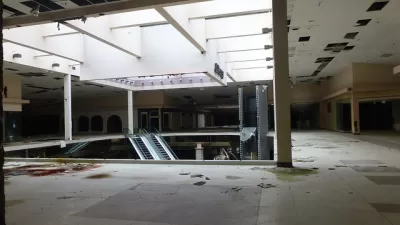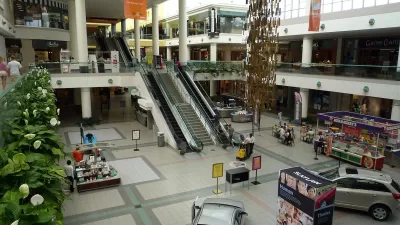‘Dead’ suburban malls, with their existing infrastructure, offer a variety of opportunities for redevelopment into everything from housing to parks.

In an opinion piece in The New York Times, Alexandra Lange calls for a more creative approach to transforming dead malls, one that considers the mall’s roots as an indoor garden. “Some should be demolished and returned to nature, but more should be rethought from an ecological point of view. While malls are a wasteful use of land, replacement with new stand-alone buildings with space-hogging parking lots only compounds that wastefulness: Better to add (perimeter buildings, solar panels, trees) and to swap (markets for department stores, classrooms for boutiques).”
Malls represent heavy investments in infrastructure, construction materials and place making that should not be discarded. The popularity of dead malls as sites for Covid testing and eventually vaccinations underlines these essential qualities: Easy road access, unencumbered indoor space, instant name recognition.
Lange outlines the history of the American mall and its role in public life, then describes a series of mall redevelopment projects that have transformed suburban malls, drawing from “Case Studies in Retrofitting Suburbia” by June Williamson and Ellen Dunham-Jones. Some have been redeveloped into mixed-use projects with apartments, retail, and office space. Others have become civic centers, medical facilities, schools, or parks.
Lange acknowledges the problematic nature of privatizing green space. According to Lange, shopping malls have “historically cultivated specific audiences by virtue of their locations sometimes in segregated suburbs and, later, by codes of conduct designed to limit the impact of groups of teenagers.” However, the changes evident in many shopping centers that formerly catered to mainly white audiences signal that malls can successfully transform into diverse venues for shopping, entertainment, and community functions that serve immigrant communities.
FULL STORY: Get In. We’re Going to Save the Mall.

Alabama: Trump Terminates Settlements for Black Communities Harmed By Raw Sewage
Trump deemed the landmark civil rights agreement “illegal DEI and environmental justice policy.”

Study: Maui’s Plan to Convert Vacation Rentals to Long-Term Housing Could Cause Nearly $1 Billion Economic Loss
The plan would reduce visitor accommodation by 25% resulting in 1,900 jobs lost.

Planetizen Federal Action Tracker
A weekly monitor of how Trump’s orders and actions are impacting planners and planning in America.

Wind Energy on the Rise Despite Federal Policy Reversal
The Trump administration is revoking federal support for renewable energy, but demand for new projects continues unabated.

Passengers Flock to Caltrain After Electrification
The new electric trains are running faster and more reliably, leading to strong ridership growth on the Bay Area rail system.

Texas Churches Rally Behind ‘Yes in God’s Back Yard’ Legislation
Religious leaders want the state to reduce zoning regulations to streamline leasing church-owned land to housing developers.
Urban Design for Planners 1: Software Tools
This six-course series explores essential urban design concepts using open source software and equips planners with the tools they need to participate fully in the urban design process.
Planning for Universal Design
Learn the tools for implementing Universal Design in planning regulations.
Caltrans
Smith Gee Studio
Institute for Housing and Urban Development Studies (IHS)
City of Grandview
Harvard GSD Executive Education
Toledo-Lucas County Plan Commissions
Salt Lake City
NYU Wagner Graduate School of Public Service





























